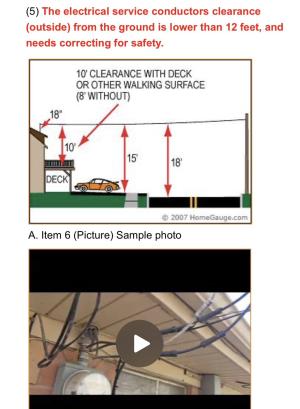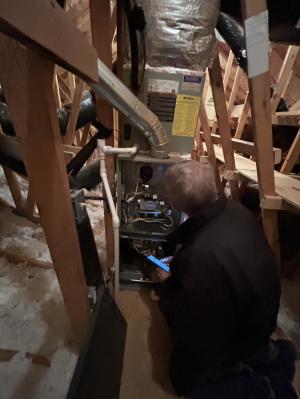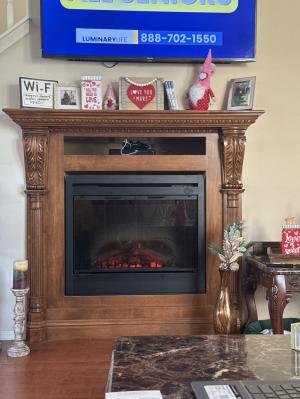How much does a home energy audit cost?
On average nationwide, a basic home energy audit costs between $300 and $700. However, you may not necessarily have to pay out of pocket for an energy audit. Some local utility companies offer a rebate or a free energy audit to their customers to help them save on their utility bills.
If you're not one of the lucky homeowners receiving a free audit, the exact price you pay will depend on the size of your house and the number of items the auditor needs to inspect. Some companies offer fixed rates, while others charge more for a larger home.
With a professional home energy audit, homeowners will have their house checked for energy-saving fixes -- like improved insulation or weatherized doors -- that could help their home be more efficient. Many homeowners end up saving on their energy bills as a result. To help you understand benefits and cost, this guide will break down common factors that impact the cost of a home energy audit, before you hire an auditor.
What's in this cost guide?
A home energy audit is an assessment that tells you how energy-efficient your house is and identifies things you can fix in order to improve its efficiency. A home energy audit can help you lower your energy bills by thousands of dollars a year.
The audit is performed by an inspector who will look at how your home is built, and rate its energy efficiency on a scale of 1 to 10. The inspector will then give you a list of next steps you can take to fix problem areas and specific improvement ideas to increase its score and efficiency.
A simple energy audit, which is visual room-by-room walk-through of your whole house, will take one to two hours, depending on the size of your home.
A more in-depth assessment, which includes manual and mechanical field tests to look for inefficient electrical or natural gas use, air leaks and poorly performing appliances will take from three to six hours.
There are many parts of your home that impact how energy-efficient it is. During a home energy audit, the inspector will do a combination of visual inspections and mechanical tests to check your overall home performance. Expect a home assessor to:
- Measure the windows, floor space and insulation.
- Record the type and age of heating and cooling appliances and water heaters.
- Look at the condition of the ductwork and heating and cooling / HVAC units.
- Look in the attic, basements, crawl spaces and any other naturally drafty areas of your home, as well as look at ceiling heights.
- Inspect your chimney, another area where air leakage can occur.
- Check doors for air leaks and quality of insulation.
- Inspect major appliances, lighting systems and exhaust fans that could be using less energy.
- Do a visual inspection of your home's exterior walls.
- Search for places where climate controlled indoor air could be leaking out, or outdoor air could be getting in.
Home energy auditors can also spot non-energy related issues, like safety issues. If they find issues like a gas leak or malfunctioning chimney flue, an auditor could save your life as well as your money.
In addition to a visual inspection, most energy audits include some or all of these tests done on site in your house:
- Blower door test. To conduct a blower door test, the inspector will put a fan in the main entry door to suck air out of the house. While it's running, they'll go from room to room looking for air leaks in walls, windows, roofs, ducts and elsewhere.
- Infrared scanning. This is also called a thermographic inspection. The inspector will point an infrared scanner at problem areas of your house to look for temperature variations on exterior walls, which could mean air leakage due to poor insulation.
- Ambient CO testing. The inspector will use a meter to detect the presence of carbon monoxide in the living areas of your house. A higher than normal level of carbon monoxide could be an indication of a malfunctioning gas-burning appliance -- which is both unsafe and wastes energy.
- Duct leak testing. This is also called Duck Blaster ® testing. The auditor attaches a fan to the duct system and measures for air leaks in the duct, which could impact how efficient your HVAC system is.
- Worst case depressurization testing. The auditor will check to see that all vented combustion appliances – gas and fuel oil water heaters, furnaces, boilers and fireplaces – are working properly and not allowing a backdraft.
- Spillage testing. The auditor will check to see that the chimney flue is working so that your home ventilation system doesn't pull toxic gases into your house.
- Heating appliance CO test. This test checks each gas appliance for carbon monoxide leaks. Unlike an Ambient CO testing, this one checks specific appliances, not the whole house.
- Oven test. The inspector will check ovens and stoves to be sure they are working properly and not using more energy than necessary.
After your energy assessment is complete, the auditor will put their findings into a database that calculates a Home Energy Score (HES) for your home. The HES is a rating system developed by the U.S. Department of Energy that rates your home based on its estimated energy use, and associated cost.
The higher your HES score, the better your home's energy efficiency. A house that gets a 10 is in the top 10 percent of energy efficient homes in the United States. A house that gets a 5 has average energy efficiency. A house that gets a 1 is gobbling up more energy than 85 percent of U.S. homes, making it a blackhole for your money when it comes to energy costs.
Along with your HES, you'll receive a list of improvements that will make your home more energy efficient. The improvements will be tailored to your home, and they'll be listed in order from least expensive projects to most expensive, along with the amount of money you could save by making the improvement. You'll get energy-saving tips, too. The improvement that turns up on most home energy audits: Add more insulation. Here are a few more projects you might find in your audit:
- Replace your windows: You might want to consider replacing your current windows with better-insulated models.
- Switch to a tankless water heater: This style of water heater produces hot water on demand, instead of using energy to maintain hot water in a tank.
- Opt for energy-efficient appliances: Old appliances are considered inefficient by today's standards. Switching to modern, less energy intensive models will contribute to energy savings throughout the year.
- Install a smart thermostat: You can lower the heat or AC when no one's at home, or have the thermostat automatically alter the temperature to save energy while adhering to your preferences.
The report gives an estimate of how much money you'll save if you make all the improvements recommended by the audit, broken out by individual home improvement recommendations.
For example, if you moved your home's score from a 2 to a 5, you could save $575 a year – which is well worth the cost of a home energy assessment. Many homeowners recoup the cost of a home energy audit within a year or two, after making these changes. If done right, your energy savings over time will pay for the cost of a home energy audit -- making it money well spent.
How to hire a professional home energy auditor
Before you hire someone to perform your home energy audit, make sure you:
- Look for a certified inspector: Ideally, your auditor will have HERS (Home Energy Rating System) or BPI (Building Performance Institute) certification.
- Get multiple free estimates: Knowing a general range for your energy audit cost will give you the confidence to hire a pro that's not over- or under-charging.



